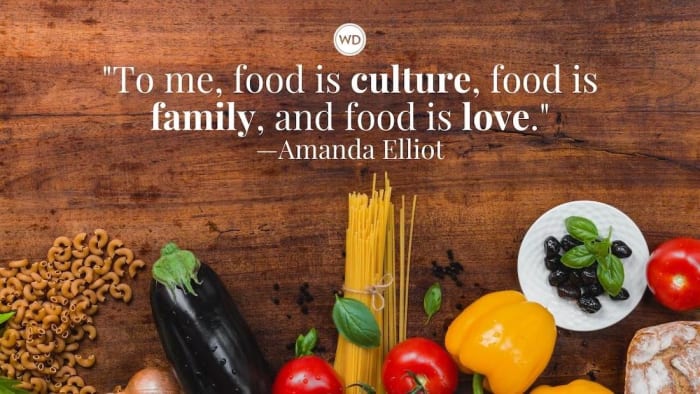How (And Why) To Write About Food in Fiction
Whoever first said “You are what you eat” probably didn’t mean it as writing advice, but that’s how I take it. What you eat doesn’t just literally keep you alive, it can say so much about who you are, where you’re from, and more.
(Amanda Elliot: On Food and Romance in Fiction)
In my new book Sadie on a Plate, a romantic comedy following a young chef on a Top Chef-like cooking show, I made spreadsheets to keep track of what every character was cooking for each challenge, because each dish was meant to tell the reader something about the character. Some dishes pointed back to the contestants’ cultural or familial backgrounds, while others showcased personality traits, state of mind, or even feelings of which they weren’t consciously aware at the time.
Even if you’re not writing foodie fiction or lavish descriptions of every meal like I was, you can still use food to help readers learn about your characters. For example, a character you want to depict as adventurous might try unusual foods from their region, like crunchy grasshoppers or grubs for an American, or a character can show that they’re stressed and busy by forgetting to eat or chowing down on prepackaged food because they don’t have time to cook. You can show readers a character’s heritage or familial background by having them cook or remember beloved family recipes, or demonstrate that they’re artistic by having them plate their food beautifully.
To get myself started, I often like to try describing a character entirely through their food choices. Let’s take Sadie, the titular heroine of Sadie on a Plate. Her favorite things to cook are the Jewish recipes passed down through her family; this indicates her cultural background and the fact that she cares deeply about her heritage. While she usually eats out at friends’ nice restaurants or cooks something quick but nutritious for herself, she spends the time just before the novel begins eating fast food. By highlighting this contrast, I hoped to show readers that her mental and emotional state had changed without having to come out and tell them that. What about your character? How might their personalities or histories or emotional states express themselves on the plate?
IndieBound | Bookshop | Amazon
[WD uses affiliate links.]
Once you’ve got that down, the actual writing of the food is a whole other beast. One of the most common complaints about food TV I’ve heard (and OK, sometimes made) is that the viewer can’t taste the food. If you think about food writing like that, we might be even worse off, because while you can at least see the food on TV, reading about it doesn’t allow you to use any of your five senses. The writing, and only the writing, must be able to make the reader fully envision the food.
My most important tip for writing about food is to use all five senses in your descriptions to really help your reader see, smell, taste, feel, and even hear the food. Try and avoid words that are general and can make it hard to envision something specific. Let’s take an apple. We could call it delicious and beautiful, but that doesn’t help us understand the specifics of what it looks and tastes like. But if we say that it’s shiny red, that it smells fruity, tastes sweet but also puckeringly tart, and that your teeth crunch on its firm white flesh, you can almost envision it yourself.
When people ask me why I write about food, it’s not just to help illustrate character traits—there are so many ways to do that—or make readers hungry (though I do like hearing I’ve done that!). To me, food is culture, food is family, and food is love. I feel connected with my grandmother who passed away by cooking her food and keeping a part of her here with us. Cooking the food of my ancestors makes me feel connected to my heritage. So many Jewish holidays circle around food: When I eat matzah on Passover or apples and honey on Rosh Hashanah or latkes during Chanukah, I feel like I’m part of a greater whole. And on an individual level, the way I show my love to my husband or family or even myself is through cooking them something that will nourish them and make them happy. Ultimately, it’s what I hope my writing does, too.

Do you yearn to write a romantic story? If so, you need to know what sets romance writing apart from other types of fiction. This course explores why romance is the same, yet different. Some essential components of romance are unique to the genre, while some romance requirements are identical to those of any good fiction story. Neither Stephen King nor Tom Clancy could sit down and write a romance unless he first familiarized himself with the specific factors that create a successful romance.



